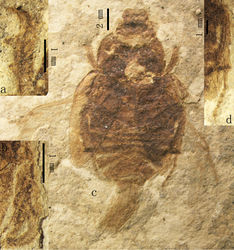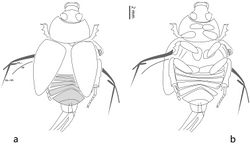Cretohypna cristata
| Notice: | This page is derived from the original publication listed below, whose author(s) should always be credited. Further contributors may edit and improve the content of this page and, consequently, need to be credited as well (see page history). Any assessment of factual correctness requires a careful review of the original article as well as of subsequent contributions.
If you are uncertain whether your planned contribution is correct or not, we suggest that you use the associated discussion page instead of editing the page directly. This page should be cited as follows (rationale):
Citation formats to copy and paste
BibTeX: @article{Yan2012ZooKeys241, RIS/ Endnote: TY - JOUR Wikipedia/ Citizendium: <ref name="Yan2012ZooKeys241">{{Citation See also the citation download page at the journal. |
Ordo: Coleoptera
Familia: Glaphyridae
Genus: Cretohypna
Name
Cretohypna cristata Yan, Nikolajev & Ren sp. n. – Wikispecies link – ZooBank link – Pensoft Profile
Etymology
The specific name is derived from Latin word ‘crista-’, which means ‘comb’ or ‘crest’, refers to the presence of a transverse carina on the head.
Material
Holotype, a well-preserved male specimen in dorsal view, registration No. CNU-COL-NN2011003. Housed in the Key Lab of Insect Evolution & Environmental Changes, College of Life Sciences, Capital Normal University, Beijing, China.
Diagnosis
Same as the genus.
Description
Body large, elongate oval and compact (Fig. 1c). Head nearly as wide as long, the widest part of head at its middle part, obviously narrower than pronotum, with transverse carina; mandibles strong, labrum and mandibles prominent, labrum exposed beyond apex of clypeus, labrum approximately five times as wide as long; mandibles exposed beyond apex of clypeus; eyes large and developed; anterior margin of clypeus moderately rounded, the presence of a transverse carina on the head. Pronotum transverse, nearly subquadrate; the widest part of pronotum at its base; anterior margin of pronotum concave; with lateral margins slightly convex, posterior margin slightly protruding. Scutellum small, triangular, about 2.2 times wider than long. Elytra long and narrow, slightly constricted to the basis, with lateral margins slightly convex, without longitudinal carina, with weak striae on lateral part, convexly constricted to the apex in the apical quarter, dehiscent. Hind wing: both hind wings preserved, well-developed, the RP, RA3+4, RA4+RP1 veins preserved on the fossil. Abdomen with six visible sternites, the first sternites not obscured by hind coxae, pygidium exposed beyond apices of elytra. Genitalia preserved and curved. Procoxa about 2.3 times wider than long, mesocoxae moderately separated. Meso- and metafemur slender. Protibia with three large teeth on outer margin (Fig. 1a); mesotibia possibly with two transverse carinae on outer margin (Fig. 1b); two spurs at the end of meso- and metatibia; spurs of mesotibia differing distinctly in length; spurs of metatibia subequal in length. Only two mesotarsomeres are preserved in this specimen, relative length of each segment (base to apex) 59: 49; metatarsus with five segments, relative length of each segment (base to apex) 120: 45: 45: 45: 68 (Fig. 1d).
Measurements
Body length 16.1 mm, greatest body width 8.4 mm, head length 3.0 mm, head width 3.4 mm, pronotum length 3.1 mm, pronotum width 6.0 mm, elytron length 8.7 mm, elytron width 4.2 mm, length of abdominal segments: 1–0.4 mm, 2–0.3 mm, 3–0.5 mm, 4–0.4 mm, 5–1.5 mm, 6 –0.9 mm.
Original Description
- Yan, Z; Nikolajev, G; Ren, D; 2012: A new, well-preserved genus and species of fossil Glaphyridae (Coleoptera, Scarabaeoidea) from the Mesozoic Yixian Formation of Inner Mongolia, China ZooKeys, 241: 67-75. doi
Images
|

